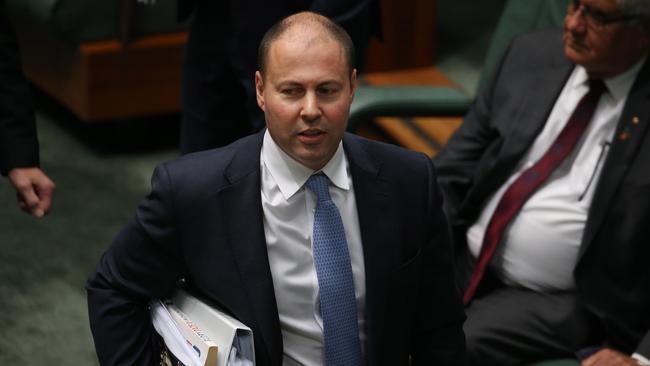Frydenberg says Australia has ‘duty’ to stand behind US
Josh Frydenberg endorses the projection of US values in the Pacific, amid China tension.

Josh Frydenberg has strongly endorsed the projection of American values in the Pacific, declaring “it’s our duty to be strong”, amid growing strategic tension between the US and China and an escalation in the trade dispute between the two global superpowers.
After a week of mixed messages from the government on China, the Treasurer delivered a ringing endorsement of the nation’s partnership with the US, which is increasingly taking on Beijing on its economic and strategic grounds.
Mr Frydenberg, who called for calm last week as the sharemarket sank on US-China trade tensions, told a dinner at the American-Australian Leadership Dialogue in Perth on Friday that it was Australia’s duty to stand with the US in times of global uncertainty. “It’s not only our privilege to be strong, it’s our duty to be strong and this is where America’s place in the world is so important,” he told the audience, which included congressman Joe Courtney, US senator Roy Blunt and Labor leader Anthony Albanese.
“It’s more important than ever that our two great nations, the United States and Australia, work more closely than ever.
“We need to work together in an unprecedented way across the economic, the strategic and the political realms, and to do so consistent with our values, consistent with our objectives, and faithful to our history. America, after all, is the nation of Lend-Lease, the Marshall Plan and “Mr Gorbachev, tear down that wall!”
He said “the peace and prosperity that we in the world enjoy today” was due in no small part to the projection of American values beyond its shores.
The speech followed a heightening of diplomatic tensions with Beijing over Liberal backbencher Andrew Hastie’s likening of China’s rise to that of Nazi Germany, declaring more needed to be done to counter Beijing’s military expansion in the Indo-Pacific.
Deputy Labor leader Richard Marles yesterday said the Coalition was divided on China, and urged the government to develop a bipartisan consensus on how to deal with its biggest trading partner. “We have got to have a settled position … over the next few decades and that does require bipartisanship,” Mr Marles said.
“It needs to be done in a sober way that acknowledges there isn’t a Cold War here — China is not the Soviet Union.”
The diplomatic spat comes as escalating trade tensions between the US and China are set to continue to plague local financial markets this week, with Australian shares set to extend last week’s 3 per cent decline.
Trade Minister Simon Birmingham yesterday became the second senior minister to call out Mr Hastie’s China comments, suggesting they threatened the national interest.
He told the ABChe would encourage colleagues to “think before you speak”, and consider the ramifications of their comments on Australia’s key relationships.
He said they should ask: “Is the making of those comments in a public way necessary? Is it helpful to Australia’s national interests?”
Reserve Bank governor Philip Lowe on Friday warned MPs that Australia had “a lot riding” on the dispute between China and the US “being resolved soon”.
The slowing local economy could be revealed in data released on Thursday, which is expected to show the jobless rate rose from 5.2 per cent to 5.3 per cent last month. US President Donald Trump last week raised the possibility trade talks with China could break off, indicating the US was prepared for such a cancellation.
Business Council of Australia chief executive Jennifer Westacott said striking a balance between Australia’s strategic and economic partnerships was key to ensuring its economic future.



To join the conversation, please log in. Don't have an account? Register
Join the conversation, you are commenting as Logout